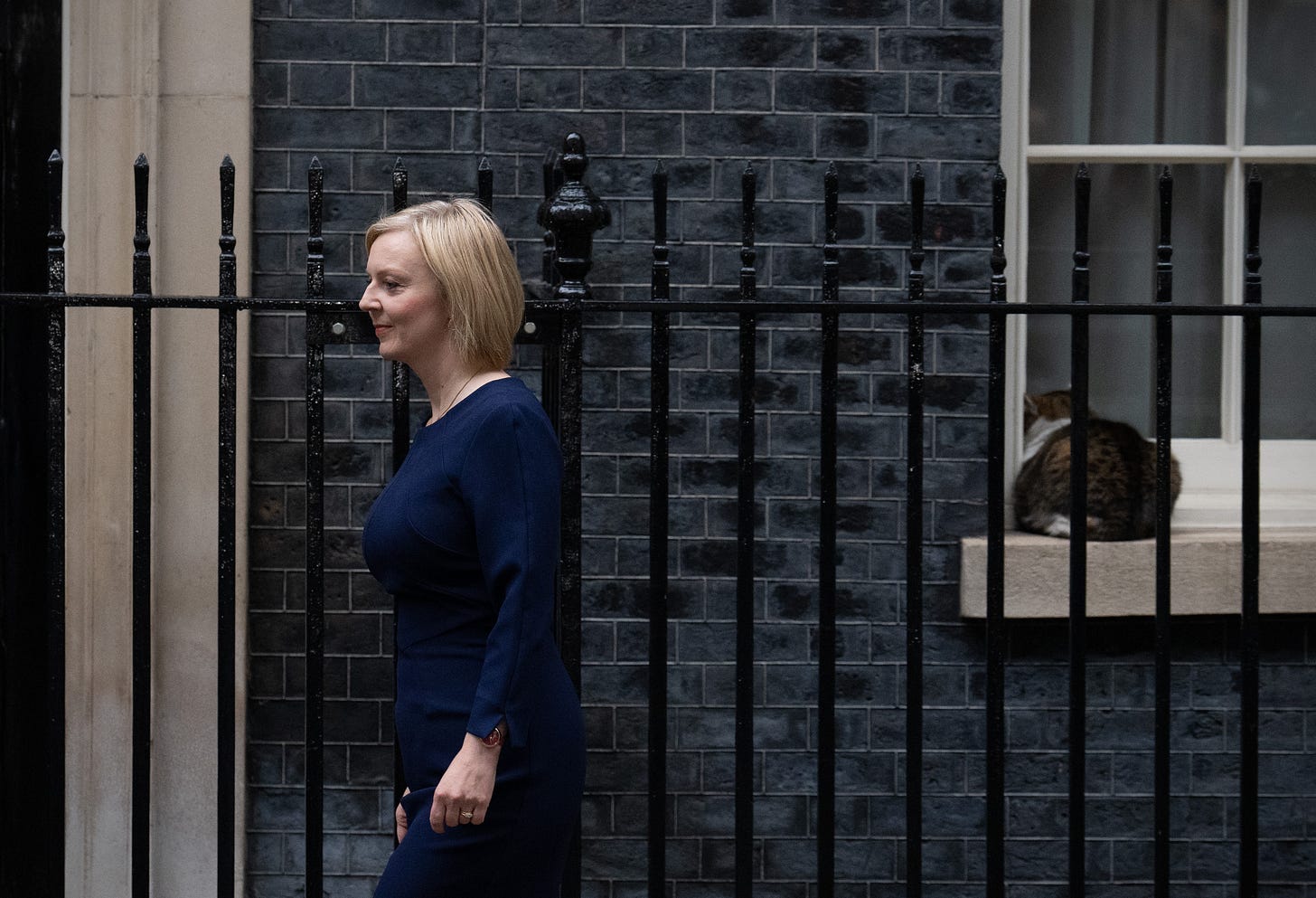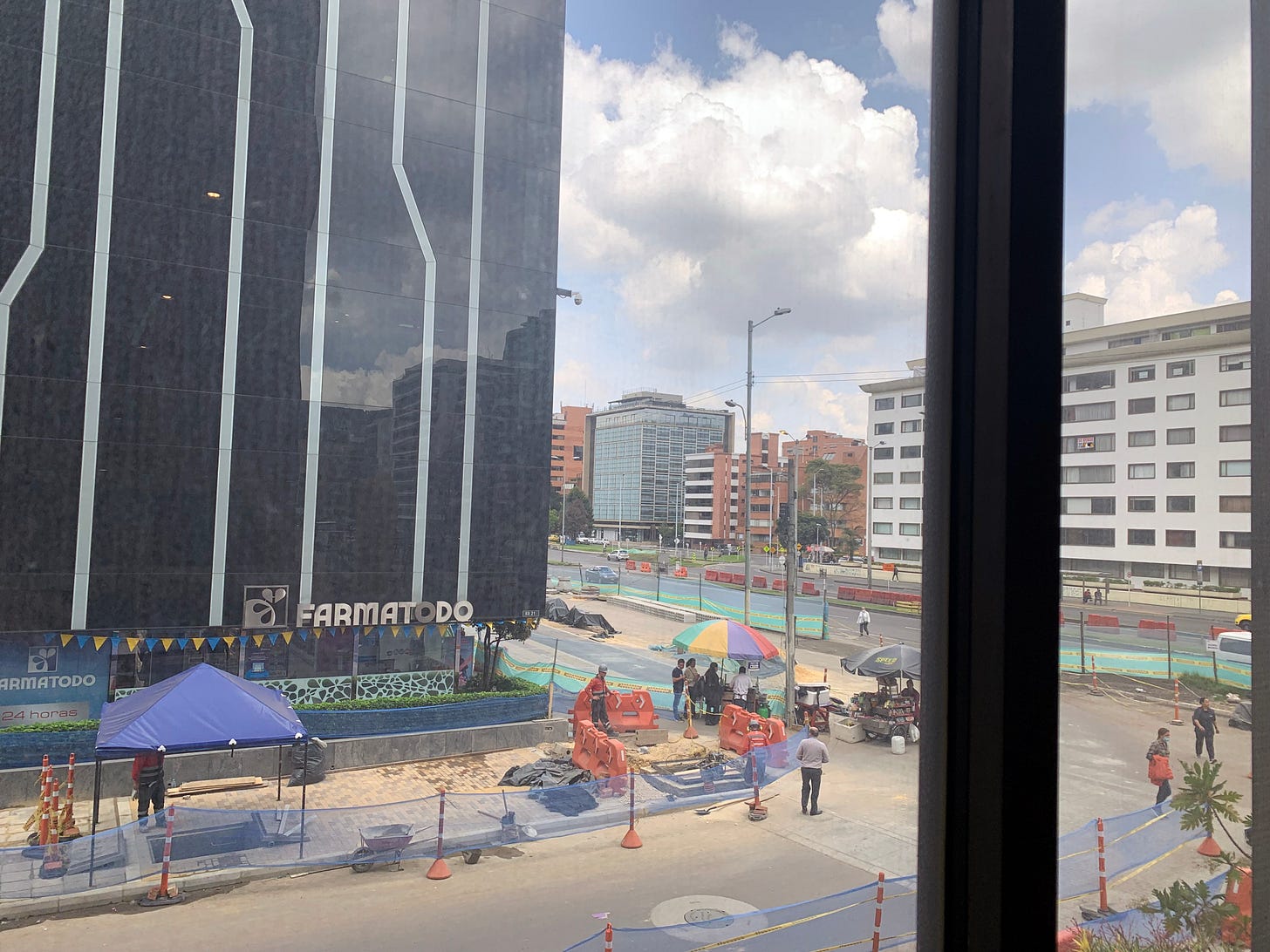The Tories' Weird Incoherent Collapse
The contradictions of Brexit and a choice for conservatism
At the heart of Brexit was, it is now becoming ever clearer, a contradiction. For some on the economically liberal right, it was a chance for Britain to wrest free from becoming a highly regulated, highly taxed province of the European Union. It was a chance to create what the EU always feared: a low-tax, deregulated Singapore-on-Thames that would snag more business investment and realize its Thatcherite potential. For others — call them Red Tories — it was a way to preserve the nation, to listen to working-class voters who felt they had become the victims of the free market and free movement of labor across Europe, and to return to a conservatism that sought to protect rather than liberate.
Boris Johnson represented both wings — he had a liberal mind but a Tory gut. And his emphasis on more public spending, redistribution of wealth from South to North (“leveling up”), new infrastructure projects, and pissing off EU technocrats all pointed toward a much broader coalition for the right. He won a stonking majority on those grounds, re-branded the Tory party, and provoked writers like me to grapple with a new bigger-state Toryism, much more similar to its Disraelian past than its Thatcherite inheritance. It was a risk — but one that reflected a genuine shift among many ordinary people, responding to the catastrophic success of the Thatcher/Blair revolution. And his charisma and charm sold it.
That brave new dawn for Toryism really wasn’t that long ago. It was echoed in much of the revamped debate about conservatism in America — with Republicans worried again about a beleaguered working class, the decline in domestic manufacturing, off-shoring, mass immigration, and the collapse of the family and a vibrant civil society. These intellectual and ideological realignments take time — but it seemed that Johnson had that time, and the wind behind him, when he won so convincingly in 2019.
But Boris was Boris; and it is difficult to be a pathological liar and deeply unserious about everything and stay in power in a parliamentary system where your peers matter. The right inheritor was Rishi Sunak, Boris’ sane chancellor. But the tiny Tory membership, like the much bigger Labour membership that once picked the nutter Jeremy Corbyn, went for the base-pleasing radical, Liz Truss, aka “the human hand-grenade,” as Dominic Cummings has dubbed her.
And almost instantly, whatever coherence or direction or even meaning that resided in post-2016 conservatism vanished. Overnight, Truss has gone full retro-Thatcher, with a dose of unfunded Reaganite fiscal stimulus thrown in. She and her chancellor, Kwasi Kwarteng, have backed a series of policies that will super-charge inflation, redistribute wealth back from the North to the South, super-size the post-Covid debt, and force the Bank of England to raise interest rates so high that soaring mortgage payments in Britain will cancel out much of the tax cuts’ stimulus anyway. It’s insane. And it has virtually no constituency beyond 20 percent of the Tory party’s elderly membership who picked her.
It’s true that some of the policies are popular. The “mini-budget” is a huge giveaway, after all, and the bulk of it is to cushion soaring energy prices because of the war in Ukraine. As Matt Goodwin shows here, Brits like the small tax cuts for the working and middle classes; and they support the energy subsidies for this coming winter and the next. But they have no idea why the government couldn’t claw back some of that money with a tax on the huge windfall profits of energy companies, and are disgusted by a set of measures that seem designed to alienate the very working-class voters Boris won:
Scrapping the cap on bankers’ bonuses? Only 12 per cent of voters support it. Abolishing the 45% top rate of income tax for people earning over £150,000 a year? Only 11% support it. Cancelling the planned increase in corporation tax? Only one in five think it’s good idea.
When a political party reverses itself so completely after a landslide election win, you’d imagine that there would be a huge campaign to explain why — a major communications push, briefings of journalists, speeches, and all the rest. But the day that Kwarteng introduced this shocker, he barely picked up the phone and went to a pub.
The prime minister herself went silent as the pound tanked, the IMF panicked, and the Bank of England said it would be forced to hike interest rates more decisively than before. Yesterday, she finally held a press call with regional and local papers in Britain … and was incapable of saying anything faintly coherent or compelling. The questions were tougher than any US president would ever face from the US media, but it was nonetheless painful to listen to. A brutal quip from an opposition leader, Angela Rayner, summed it up: “Liz Truss has finally broken her long painful silence with a series of short painful silences.”
Immigration? You might recall how Brexit was fueled in part by the demographic revolution initiated by Tony Blair, and the public’s sense that they had lost control of their own country. Yes, part of this was ethnic and cultural, as the once homogeneous island was turned into something it had never previously been at a breakneck pace. Both those in favor of staying in the EU and those who wanted to leave preferred immigration from the EU to immigration from the rest of the world.
But Boris’ immigration reform — while taking back control from the EU — massively liberalized skilled, non-white immigration from the rest of the world. This past year has seen foreign work visas surge by 80 percent. As Goodwin writes, there are now “close to 1.8 million non-EU nationals working in Britain — 302,000 more than a year ago.” The biggest contributors? India, the Philippines, Nigeria and, with a cool 744 percent increase, Zimbabwe. This is a great refutation of the idea that Boris was or is a racist. But I don’t think it’s what most Brexit voters were anticipating. (Ed West, in fact, observes how different this makes the British right from the resurgent right-populism in Italy and Sweden. The Tories have actually embraced mass non-white immigration since Brexit, not kept power by vowing to end it.)
It’s enough to make you think that the Tory party has become an incoherent, chaotic shit-show, zig-zagging, divided, bitter and exhausted after 12 years in power. This is not to say, of course, that supply-side reforms in a country with struggling productivity are bad; nor to deny that Brexit has widened the scope of actions the UK government can take. (Tyler Cowen notes that there’s less stimulus in the plan than some are claiming.) But policies this ill-timed, this different from what has gone before, and this horribly communicated are a form of collective political suicide. It does not in any way surprise me that the polling has shown a simply staggering and instant collapse in Tory support. In one poll, Labour now leads by 33 points — the largest lead by any party since the 1990s.
So what now? Well, the Tory party has its annual conference next week — so we won’t lack for drama. The most hopeful scenario, some Tory friends tell me, is that the energy crisis won’t be as bad as many feared, that the economy might rebound with this stimulus, and that some of these reforms will indeed juice some productivity gains. That’s a profoundly weak case for optimism. But the deeper problem is figuring out just what conservatism now is. Neoliberalism unbound? Or illiberalism unleashed? Protectionism? Ever freer trade? Pro-immigration neoliberalism? Or anti-immigration conservatism?
The good news is that the Tories are not careening toward the anti-democratic authoritarianism of the GOP. The bad news is that they have nothing else coherent to offer, and no one left with any talent to sell it. Advantage: Keir.
(Note to readers: This is an excerpt of The Weekly Dish. If you’re already a subscriber, click here to read the full version. This week’s issue also includes: a taboo-touching talk with Richard Reeves on the ways that men and boys are struggling in the 21st century; many reader dissents over my latest piece on the identity craze; more debate over the sexual revolution prompted by the Louise Perry pod (which we just transcribed); nine notable quotes from the week in news; nearly two dozen pieces we recommend by other Substackers; two nods for the Yglesias Award; a Mental Health Break of a talented young pianist; window views from sunny South Carolina and the republic of Georgia; and the results of the View From Your Window contest — with a new challenge for sleuths. Subscribe for the full Dish experience!)
From a lifelong learner:
I am a “lapsed” left-liberal (and a “lapsed Catholic,” if that matters). I read the Dish regularly as a paid subscriber. I generally only agree with a small percentage of what you post. That means nothing. I read the Dish to get ANOTHER OPINION — not my own — and to exercise my 68-yr-old brain.
New On The Dishcast: Richard Reeves
Richard is a senior fellow at Brookings, where he directs the Boys and Men Project. He’s also been the director of Demos — the London-based political think-tank — an adviser to Nick Clegg in David Cameron’s coalition government, and a Guardian journalist. His latest book is Of Boys and Men: Why the Modern Male Is Struggling, Why It Matters, and What to Do About It. (For more, follow his new substack.) I’m fascinated by the challenges of modernity for the weaker sex (men), and Richard has grappled with the questions more calmly than most.
Listen to the episode here. For two clips of our convo — on how boys are less resilient than girls, and on the racialized sexism against black men — pop over to our YouTube page. Other topics we touch on: the cartoonish masculinity of MAGA, the need for male teachers, the huge gains of black women, the gender pay gap(s), the class gaps of marriage, deaths of despair, sex-segregated sports, and the pathologizing of male sexuality.
Our recent episode with Louise Perry on the sexual revolution is now available as a transcript. Check out the listener debate here — it’s the most trafficked post of its kind so far. That debate (and TMI) continues here, along with commentary on the Hitch convo we posted last week on religion and terrorism. Here’s a clip:
Browse the entire Dishcast archive for an episode you might enjoy. From a new subscriber:
I listen to about 30 podcasts, but I’m a paying subscriber to about five of them. Given how eagerly I anticipate every new drop of the Dishcast, it became unconscionable for me to continue being a freeloader. Keep up the amazing work!
Dissents Of The Week: Missing The Forest?
A reader writes:
A “tree”? I can’t even. The identity stuff is bonkers. However, you asserting that it has “the full backing of the president and the Democratic Party” is a stretch. I’m sure there are some elected Democrats who both understand and embrace the wacky edge of gender identity, but I’m doubtful Biden and most elected Ds are aware of the fish or tree or eunuch stuff. Fair to criticize them for ignorance and demand they pay attention to the details, but way too far to say such things have their full backing.
Five more dissents, including expert takes on the history of eunuchs, are here, along with other commentary on the identity craze. (Spoiler alert: litter boxes in schools.) Seriously, you’ll be better informed after reading these dissents than reading most newspapers these days. Dish readers seem to know everything.
As always, keep the dissents coming: dish@andrewsullivan.com.
Face Of The Week
A reader serves it up:
The Pet Shop Boys were at Merriweather Post Pavilion last week along with New Order and Paul Oakenfold. Assuming you weren’t there, I thought you would appreciate this shot of Neil:
He looks great. I have to say it depresses me that the PSBs have to tour alongside New Order and Paul Oakenfold in the US. No offense to either of the latter (of whom I’m also a big fan), but this would never happen outside the US. The PSBs are among the greatest pop duos in history. Sharing a billing is unconscionable.
Also sad to say I missed this tour. Got lost in the transition from Ptown to DC. Voice almost back to normal now though.
In The ‘Stacks
This is a feature in the paid version of the Dish spotlighting more than a dozen of our favorite pieces from other Substackers every week. This week’s selection covers subjects such as the Iranian protests, Meloni’s win in Italy, climate change, and the YIMBY movement. Below are a few examples:
Comedy writer Jeff Mauer parses the paradox of why merit is both meaningless and vital.
Andy Owen tells the story of Doggerland, back when Britain was a peninsula of Europe.
You can also browse all the substacks we follow and read on a regular basis here — a combination of our favorite writers and new ones we’re checking out. It’s a blogroll of sorts. If you have any recommendations for “In the ‘Stacks,” especially ones from emerging writers, please let us know: dish@andrewsullivan.com.
The View From Your Window Contest
Where do you think it’s located? Email your guess to contest@andrewsullivan.com. Please put the location — city and/or state first, then country — in the subject line. Proximity counts if no one gets the exact spot. Bonus points for fun facts and stories. The winner gets the choice of a VFYW book or two annual Dish subscriptions. If you are not a subscriber, please indicate that status in your entry and we will give you a free month subscription if we select your entry for the contest results (example here if you’re new to the contest). Happy sleuthing!
The results for last week’s window are coming in a separate email to paid subscribers later today. That email consistently gets a 65 percent open-rate — almost as high as the main Dish — which is extremely high for the newsletter industry. Dishheads love the escape from the partisanship and culture wars of the week. From the latest contest results, a beagle-pander:
Is this window in Hanoi, Vietnam? Yes, that is a WAG [wild-ass guess]. Since I don’t have a definitive match this week and cannot provide my usual photos, I’m instead including a picture of me with Lucie, the sweetheart of a beagle that belongs to my friends in San Diego, who I visited last week:
See you next Friday.






